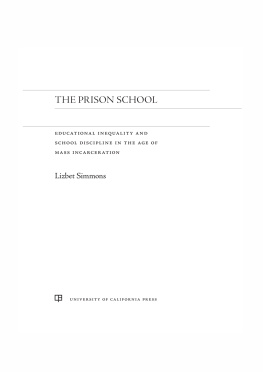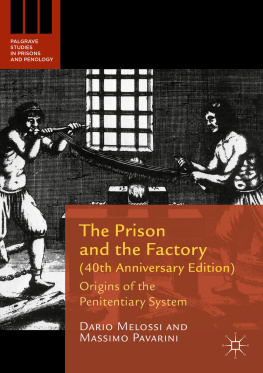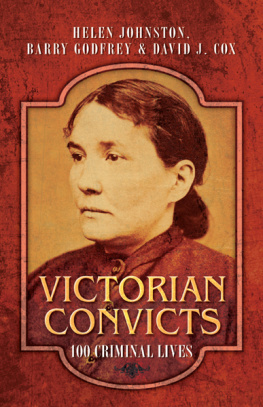Voices Cry Out: Postprison Mind-Set
Ricardo Smith, Ph.D.
Copyright 2019 Ricardo Smith, Ph.D.
All rights reserved
First Edition
PAGE PUBLISHING, INC.
New York, NY
First originally published by Page Publishing, Inc. 2019
ISBN 978-1-64462-771-6 (Paperback)
ISBN 978-1-64462-772-3 (Digital)
Printed in the United States of America
Table of Contents
Abstract
T his book focuses on giving voice to the postprison experiences of African American men. The research was conducted in the greater Cincinnati, Ohio, area, and it included interview participants from both Hamilton and Butler counties. The problems and effects produced by the impact of labeling prisoners, prison debt, and moneymaking added to the policy restraints affecting the lives of ex-offenders (who usually come from targeted poor communities) are described as an apparatus of social control, particularly upon African American men. Ex-offenders may experience a postprison system of no way out , which is a type of social incarceration. The study addresses the postprison issues of ex-offenders finding employment, finding housing, and being registered to vote. This interpretative analysis through in-depth interviews examines the postprison lives of African American men.
Acknowledgments
T his work is dedicated to the glorious memory of my grandmother, Mattie Elizabeth Williams (Smith), and Mr. Gary A. Williams. I am so thankful for all the years that Grandma instilled in me the values of spiritual discernment for divine guidance. She taught me to pray at a young age while living at Main Street projects, Middletown, Ohio. Grandma, I count my blessings every day and appreciate all that you have given me upon this earth. The flowers are very pretty now as you rest in true peace in paradise. To my mother, thank you. My mother, Geraldine, is my stabilizer. She has always been there for me, and I appreciate my mom so much. I cannot express enough what she has done with her presence alone. Thank you, Ma. I love you for everything seen and unseen. You are why I can go forward so persistently.
I want my daughters, Angela and Olivia, to know that this work and my future works are for you to excel further than I have had in the education journey. Much of my discipline and continual persistence is because Angela and Olivia will pursue future work in the arts, design, medical, and educational health fields. My daughters are my pride (Angela) and joy (Olivia). I am also grateful for their mother; Catherine imparted in them the dignity and value of higher education early in their lives. You are a wonderful educator. Thank you, Catherine. You gave words of life to lift all of us, and I am alive because of those resurrecting words.
I cannot forget my late aunt Mildred Smith; she wanted me to be a medical doctor or lawyer. I can say that I am a doctor of philosophy. My late uncle Alvin Smith kept me under his wing and showed me how to elevate goals in this life. I have great gratitude for all the support that enabled me to complete this work of giving voice to the postprison experiences of African American men in both Hamilton and Butler counties in Ohio.
I love you, Grandma. Thank you so much.
Chapter 1
Prison Power and Labels
T he impact of postprison social incarceration inevitably affects the lives of ex-offenders. Often, it seems that the inability of the ex-offender to function and survive in society leaves no way out of a type of penal system. There also are certain social barriers that exist and persist in society as the ex-offender seeks to start anew returning to his/her respective community. In some states, the ex-offender, who may often be labeled and stigmatized as criminal for life, does not have the right to vote, cannot receive public assistance for housing, may not attain a federal education loan in some instances, may not have the privilege of a drivers license (in some states), and most significantly, may be unable to secure stable employment (LAC 2004). Barred from public housing while forced to check the box of a crime or felony conviction on employment applications, ex-offenders may find themselves permanently locked out of the mainstream economy (Alexander 2010). The isolation becomes a type of social incarceration without bars.
The social isolation that the ex-offender experiences after being released from prison does not provide for a smooth transition back into communities. Many of these communities are poor, jobless areas with the prevalence of drug infestation. Upon release from state prisons in Ohio, many ex-offenders proceed through a county reentry program or halfway house to receive assistance and resource information as they re-enter the community. Ex-offenders may not be completely aware of the social barriers they face in society, especially if one has been convicted of a felony. This research in the greater Cincinnati, Ohio, area (Hamilton and Butler counties) gives voice to African American ex-offenders concerning their postprison and/or reentry program experiences. In more ways than one, the ex-offender returns to the community with the lingering criminal label.
Labeling Prisoners
The impact of prison systems upon the lives of African American men involves power, race, and class. Tonry (2011) indicated that black men are seven times more likely than white men to be in prison; black men are more likely than whites to be stopped by the police, arrested, prosecuted, and convicted . Even though there are rehabilitation and reentry programs assisting the ex-offender, criminals still bare the stigma (Alexander 2010, Schneider and Ingram 1997) of being negatively labeled and categorized as deviant, dangerous, and subhuman. According to the Legal Action Center (2004), for many ex-offenders, there is a high rate of recidivism because they return to communities where jobs are scarce. There is no public assistance for public housing, no opportunities for federal education loans (crimes committed on a college campus), and other barriers that eventually may lead the ex-offender back to prison. Michelle Alexander (2010) examined the prison as a laboratory for perfecting class-authoritarian techniques; the prison system is an extension of the police force that fulfills in an ordered and combined space the functions of police power in an unordered space (p. 15). In a system of power and control, the controlled are very important to the controllers; the prisoners are watched, counted, studied, and recounted (Alexander 2010, Foucault 1975).
In the United States, federal and state prisons hold offenders sentenced to terms of a year or longer; local jails hold pretrial detainees and offenders sentenced to terms of less than a year (Tonry 2011). As of 2008, there were about 2.3 million persons in the United States in jails and prisons; a staggering 5.1 million people are on probation or parole, and more than 70 percent are people of color (Alexander 2010). Furthermore, she recognized that racial and class bias is prevalent in people of color serving longer sentences along with the persistence of disproportionate policing and punitive measures directed against the poor (Alexander 2010, xiii). According to Joel Olson (1996), the primary function of prison systems is social control; as a means of suppression, prisons create a more politically obedient and economically useful population. Olson (1996) noted that since prisons do isolate and warehouse offenders, they are also about controlling the rest of us as much as controlling the prisoner (p. 41). Social control is defined as a societal process or political mechanism utilized to regulate individual and/or group behaviors (Macionis 2008). People of color are often labeled criminal, and it is legal to discriminate against and hate the criminal (Alexander 2010). Studies and research have shown that there are not significant racial differences in reported crimes or drug use, but the drug and crime control policies do disproportionately affect black Americans (Alexander 2010, Tonry 2011). There are more than one million (Mauer and Hauling 1995) nonviolent offenders in local jails and state and federal prisons. While incarceration rates are increasing, the sentencing project has indicated a decline in violent and property crimes since the early 1990s (Mauer and Hauling 1995).





